7 Best Herbs For Hair Growth and Thickness (With Recipes)
Hair is an important topic for a lot of people, men and women alike. So it's important to know The Best Herbs For Hair Growth and Thickness if you want to make a true and lasting impact on your hair's strength and shine.
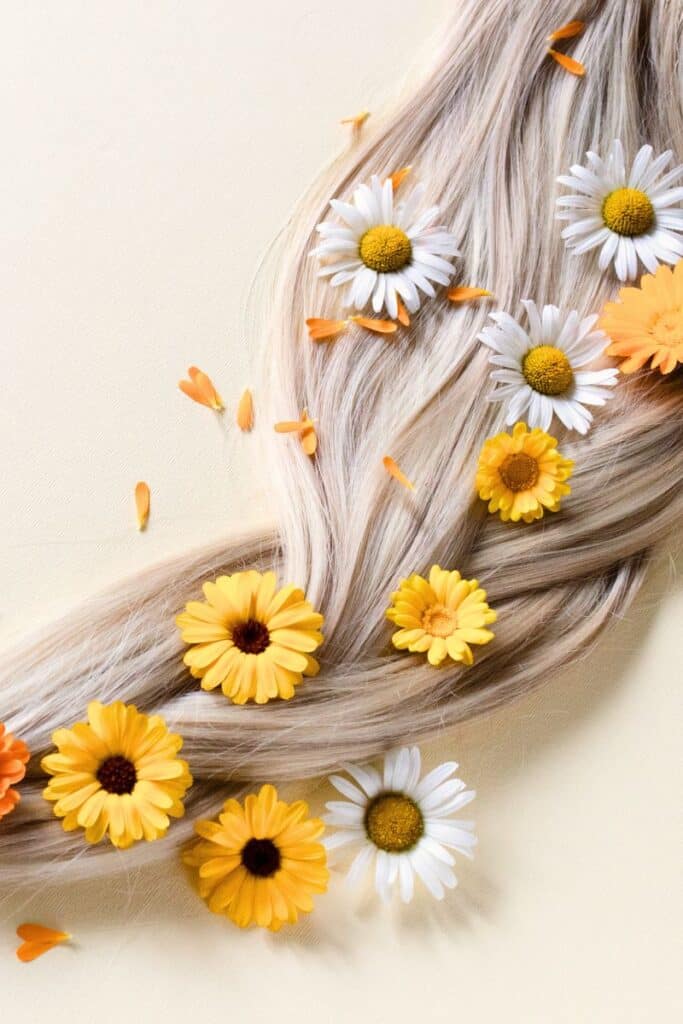
Healthy hair is not just about aesthetics; it's an outside show of your overall well-being. It's a reflection of how your body functions, and herbs have a remarkable role to play in nurturing the lush tresses you desire.
In this journey through the world of hair and herbs, we'll uncover the connection between them and how you can harness herbal properties for healthy hair growth and shine.
Understanding Natural Hair Growth
Hair growth is a beautifully orchestrated process that often goes unnoticed until something disrupts it. To appreciate how herbs can intervene positively, let's delve into the hair growth cycle and the factors that influence it.

The hair growth cycle consists of three phases: anagen (growth), catagen (transitional), and telogen (resting). Understanding this cycle reveals why nurturing hair is a continuous effort, as hair strands are at different stages of growth.
Various factors affect hair growth, such as genetics, hormonal imbalances, and nutrition. It's this interplay of internal and external factors that herbs can address to promote healthy hair.
Herbs as Natural Remedies For Your Hair
Herbs have been nature's remedies for centuries. Their unique compounds offer a holistic approach to hair care. Their benefits extend beyond surface-level improvements, targeting the very roots of your hair health.
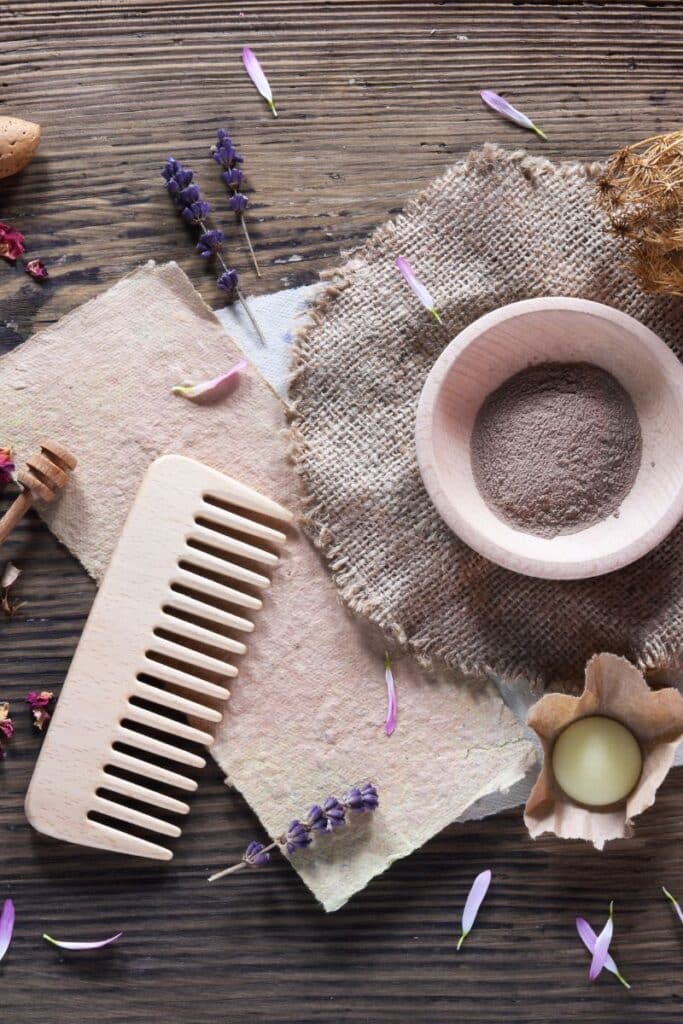
The advantages of herbs for hair growth are numerous. They possess anti-inflammatory properties, improve blood circulation to the scalp, and provide essential nutrients that your hair craves. In embracing herbs, you're embracing the idea that herbs can heal the body and can be medicine for your hair.
7 Best Herbs for Hair Growth and Thickness
Some of these herbs are well-known for their hair-supporting properties, while some are lesser-known ayurvedic herbs. It's important to find the herbs that work for you, as everyone is unique and responds differently to herbs.
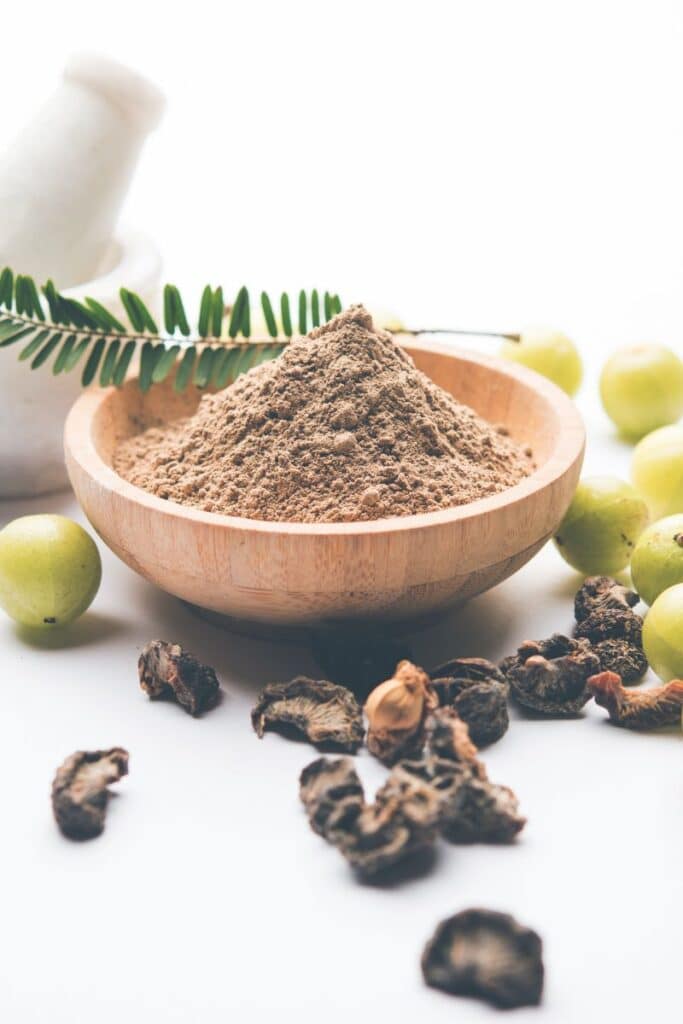
1. Rosemary (Salvia rosmarinus)
Rosemary, more than a culinary herb, strengthens hair follicles and boosts blood circulation to the scalp, nurturing hair from its roots.
- Harness the power of rosemary with DIY rosemary-infused oil or homemade hair growth treatments.
2. Aloe Vera
Aloe vera, a succulent wonder, brings a multitude of benefits to your hair. Its proteolytic enzymes repair damaged cells on the scalp, paving the way for rejuvenation.
- To unlock its potential, apply fresh aloe vera gel to your scalp or explore the wonders of DIY aloe vera hair treatments.
3. Lavender (Lavandula angustifolia or Lavandula officinalis)
Lavender oil, known for its calming aroma, possesses anti-inflammatory properties that can soothe your scalp and prevent hair loss.
- Create your own lavender-infused oil to infuse your hair care routine with its benefits.
4. Peppermint (Mentha piperita L.)
Peppermint oil, with its invigorating aroma, plays a crucial role in stimulating blood flow to the hair follicles, promoting new hair growth.
- Dive into the world of DIY peppermint hair masks to experience its rejuvenating effects.
5. Hibiscus (Chinese Hibiscus or Rosa Sinensis)
Hibiscus flowers and leaves are a popular choice for promoting hair health. They help in preventing hair fall, strengthening hair, and adding a natural gloss.
- Hibiscus can be used in the form of hair masks, herbal rinses, or as an ingredient in herbal oils.
6. Methi (Fenugreek)
Methi seeds are rich in protein and nicotinic acid, which are known to stimulate hair growth and improve hair texture.
- Soaking fenugreek seeds and applying the resultant paste to your hair can strengthen your hair and make it shinier.
7. Neem (Azadirachta Indica)
Neem is an excellent herb for maintaining a healthy scalp. It possesses antimicrobial properties that combat dandruff and other scalp issues.
- A clean and healthy scalp is the foundation for shiny and healthy hair. Use neem oil as a scalp massage or make a neem leaf scalp rinse.
DIY Herbal Hair Care Recipes
If you prefer a more hands-on approach to hair care, DIY herbal solutions are at your fingertips. Explore these methods to enhance your hair care routine:
Herbal Hair Rinses
Herbal hair rinses offer natural conditioning and shine. Discover the benefits and try recipes featuring the herbs listed above.

Hibiscus and Fenugreek Hair Rinse
This will promote hair growth, strengthen hair, add shine, and improve scalp health while acting as a natural conditioner.
- Ingredients:
- 2 tablespoons of dried hibiscus petals
- 1 tablespoon of fenugreek seeds
- 2 cups of water
- Instructions:
- Combine hibiscus petals and fenugreek seeds in a pot with water.
- Bring the mixture to a boil, then reduce the heat and simmer for 15-20 minutes.
- Strain the liquid into a container and allow it to cool.
- Use this herbal rinse after shampooing your hair, massaging it into your scalp and hair.
- Leave it on for a few minutes and then rinse thoroughly with cool water.
- Hibiscus and fenugreek can promote hair growth and add shine to your locks.
Aloe Vera and Peppermint Rinse
This combo will invigorate your scalp and strengthen hair follicles.
Ingredients:
- 2 tablespoons of fresh aloe vera gel
- A handful of fresh peppermint leaves (approximately 1/4 cup or 2 Tbsp dried peppermint leaves)
- Water (enough for infusion)
Instructions:
- Mix 2 tablespoons of fresh aloe vera gel with a strong infusion of a handful of fresh peppermint leaves (approximately 1/4 cup). To infuse the peppermint, bring enough water to cover the peppermint leaves to a boil, then pour it over the rosemary leaves in a heatproof container. Let it steep for about 15-20 minutes, then strain the liquid.
- Apply this mixture to your hair and scalp after shampooing.
- Leave it on for a few minutes.
- Rinse with cool water.
Hibiscus and Neem Scalp Rinse
This blend will soothe your scalp, combat dandruff, and promote hair health.
Ingredients:
- 2 tablespoons of dried hibiscus flowers
- A handful of fresh neem leaves (approximately 1/4 cup)
- 2 cups of hot water
Instructions:
- Combine 2 tablespoons of dried hibiscus flowers and a handful of fresh neem leaves (approximately 1/4 cup) in a container.
- Pour 2 cups of hot water over the hibiscus flowers and neem leaves.
- Allow the mixture to steep for about 15-20 minutes.
- Strain the liquid to remove the hibiscus flowers and neem leaves.
- Use this herbal rinse as a final rinse after your regular shampoo.
Herbal Hair Masks
These masks provide deep nourishment and address specific hair issues. Find out how to create your personalized herbal hair mask recipes, using ingredients like fenugreek seeds or hibiscus.
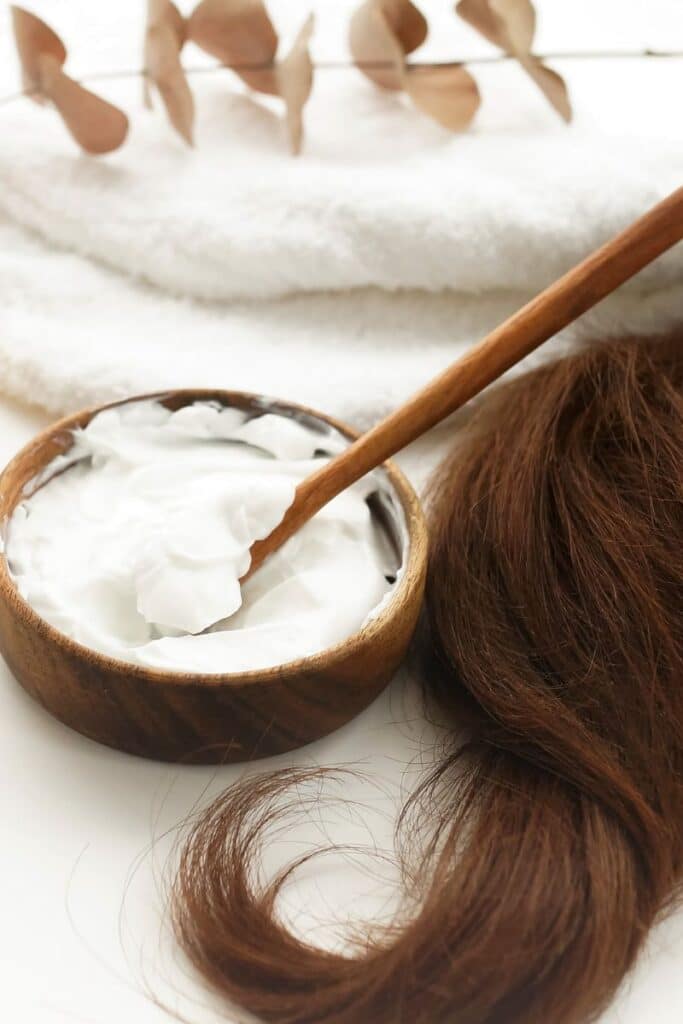
Fenugreek and Coconut Milk Hair Mask
- Ingredients:
- 2 tablespoons of fenugreek seeds
- 1/2 cup of coconut milk
- Instructions:
- Soak fenugreek seeds in water overnight to soften them.
- Grind the soaked seeds into a paste, and then mix it with coconut milk to create a smooth paste.
- Apply this mask to your hair and scalp, ensuring even coverage.
- Leave it on for 30-45 minutes, allowing the nutrients to penetrate your hair.
- Rinse with a mild shampoo and cool water. This mask can help in hair growth and add shine.
Aloe Vera and Hibiscus Glossy Hair Mask
This mask adds natural shine and strength to your hair, leaving it looking healthy and vibrant.
Ingredients:
- 2 tablespoons of fresh aloe vera gel
- A handful of crushed hibiscus flowers (approximately 1/4 cup)
Instructions:
- Blend 2 tablespoons of fresh aloe vera gel with a handful of crushed hibiscus flowers (approximately 1/4 cup) to form a smooth paste.
- Apply this mixture to your hair from roots to tips.
- Let it sit for an hour before rinsing.
Rosemary and Fenugreek Strengthening Mask
This mask will strengthen your hair and improve texture.
Ingredients:
- 2 tablespoons of fenugreek seeds (methi)
- Enough rosemary-infused oil to create a paste
Instructions:
- Create a paste by mixing 2 tablespoons of fenugreek seeds (methi), which should be soaked overnight, with enough rosemary-infused oil to create a smooth paste.
- Apply this mask to your hair and leave it on for about 30 minutes before washing.
Herbal Oils for Hair
Herbal-infused oils pamper your hair, strengthening strands and promoting growth. Learn how to make and use these oils for maximum benefits.
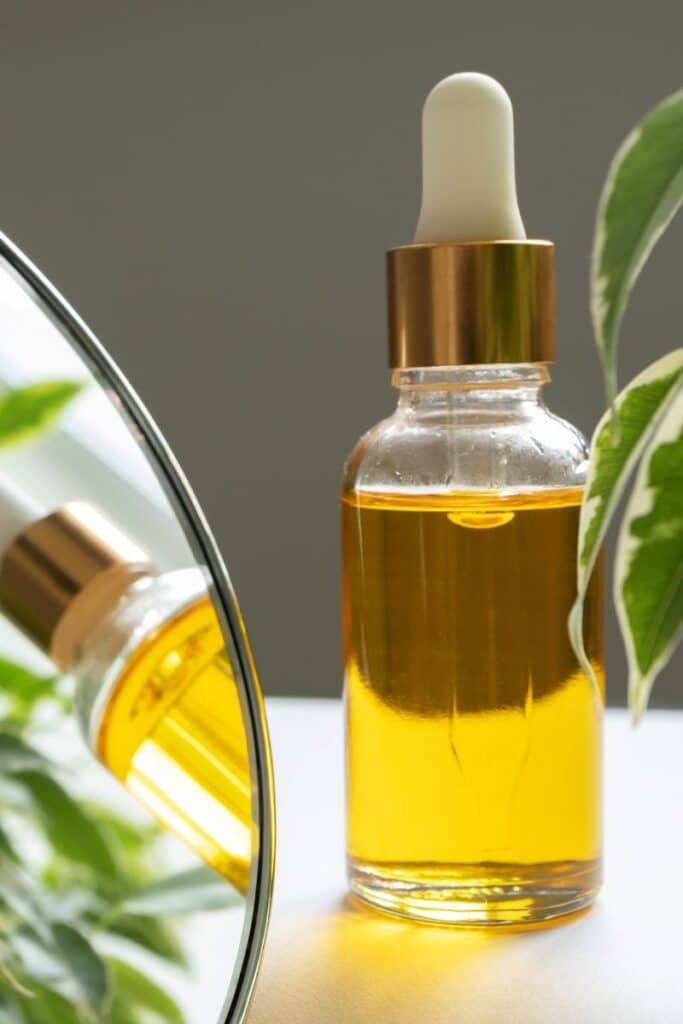
Rosemary and Lavender Herbal Oil
- Ingredients:
- 2 tablespoons of dried rosemary leaves
- 2 tablespoons of dried lavender flowers
- 1 cup of carrier oil (such as jojoba or almond oil)
- Instructions:
- Combine rosemary leaves, lavender flowers, and carrier oil in a glass jar.
- Seal the jar and place it in a cool, dark place for about two weeks to allow the herbs to infuse into the oil.
- Strain the oil to remove the herbs.
- Use this herbal-infused oil for regular scalp massages and as a leave-in treatment for shiny and nourished hair.
Hibiscus and Lavender Nourishing Hair Oil
This nourishing hair oil will strengthen your hair and provide a natural gloss, promoting overall hair health and vitality.
Ingredients:
- A handful of hibiscus flowers (approximately 1/4 cup)
- A few drops of lavender oil
- Enough carrier oil (e.g., coconut oil, olive oil) to cover the ingredients
Instructions:
- Blend a handful of dried hibiscus flowers (approximately 1/4 cup) with a few drops of lavender oil.
- Combine this mixture with enough carrier oil of your choice to cover the ingredients, ensuring it is fully immersed.
- Let this infuse for 2-4 weeks, then strain.
- Massage this fragrant oil into your scalp and hair.
- Leave it on for a few hours or overnight.
Rosemary Castor Oil Hair Mask
This hair mask is great for promoting hair growth, strengthening hair, and improving overall hair health.
Ingredients:
- 2 tablespoons of castor oil
- 1 tablespoon of rosemary oil or fresh rosemary leaves
- 1 tablespoon of honey (optional, for added moisture)
Instructions:
- If you're using fresh rosemary leaves, start by infusing the castor oil with rosemary. To do this, add 1 tablespoon of fresh rosemary leaves to the castor oil.
- If you're using rosemary oil, you can skip the infusion step.
- Add 1 tablespoon of honey to the mixture if you want to add extra moisture to your hair.
- Mix the ingredients thoroughly to create a smooth and consistent hair mask.
- Apply the mask to your dry or damp hair, starting from the roots and working your way down to the tips.
- Massage your scalp gently for a few minutes to stimulate blood circulation and ensure the mask is evenly distributed.
- Once your hair is coated, put on a shower cap or wrap your hair in a warm towel to create a warm environment for the mask to work.
- Leave the mask on for at least 30 minutes. For better results, you can leave it on for an hour or even overnight.
Herbal Scalp Treatments
A healthy scalp is the foundation of lush hair growth. Herbs like neem oil, with its antimicrobial properties, can combat flaky scalp issues, while gotu kola promotes scalp circulation, creating an optimal environment for hair follicles.
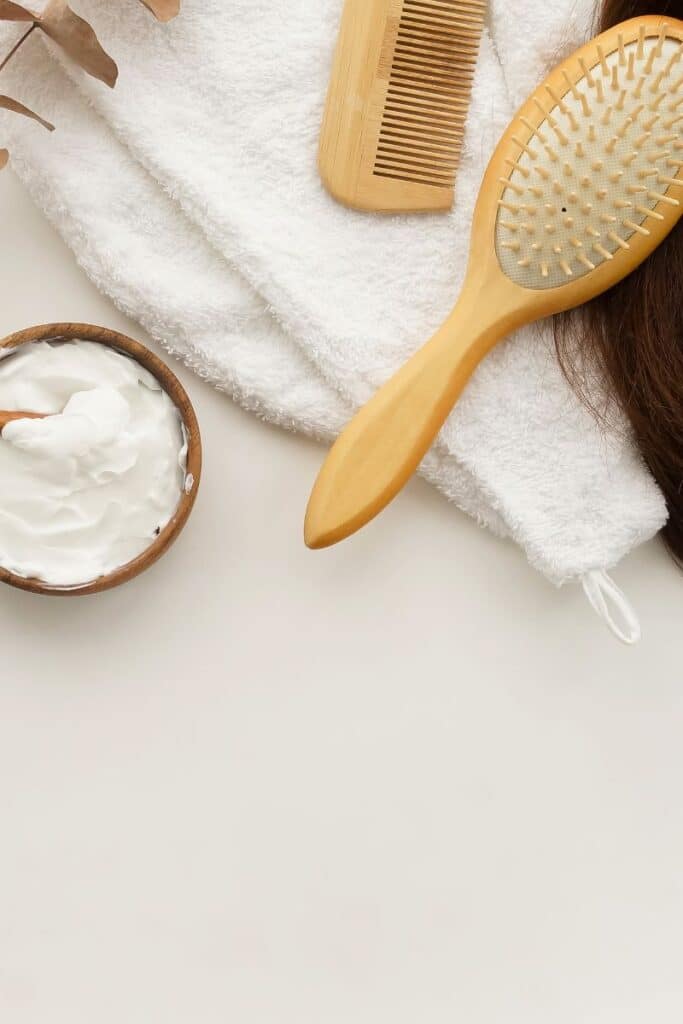
Neem and Gotu Kola Scalp Treatment
This neem and gotu kola scalp treatment combines the antimicrobial properties of neem with the circulation-enhancing effects of gotu kola. It helps combat scalp issues like dandruff, itching, and flakiness while promoting an ideal environment for hair follicles to thrive. Regular use of this treatment can contribute to a healthier scalp and, consequently, stronger and more vibrant hair.
Ingredients:
- 2 tablespoons of neem oil
- 1 tablespoon of dried gotu kola leaves or powder
- 2-3 drops of essential oil (such as lavender or rosemary, for a pleasant scent)
- A small glass or plastic bowl
Instructions:
- Begin by warming the neem oil gently. You can do this by placing the neem oil container in a bowl of hot water for a few minutes. Ensure that it's comfortably warm but not too hot.
- While the neem oil is warming, prepare the gotu kola infusion. Boil about 1 cup of water and pour it over the dried gotu kola leaves or powder in a heatproof container. Cover it and let it steep for about 15-20 minutes to create a strong infusion.
- Once the gotu kola infusion is ready, strain it to remove the leaves or powder, leaving you with the liquid.
- In a small glass or plastic bowl, combine the warmed neem oil and the gotu kola infusion. Add a few drops of your chosen essential oil for a pleasant scent.
- Mix the ingredients thoroughly to create a scalp treatment solution.
Application:
- Before applying the treatment, ensure your hair is dry or slightly damp.
- Section your hair to expose your scalp.
- Using a cotton ball or your fingertips, apply the neem and gotu kola scalp treatment directly to your scalp.
- Gently massage your scalp for 5-10 minutes, ensuring that the treatment is evenly distributed.
- Once your entire scalp is covered, cover your hair with a shower cap or wrap to retain heat and enhance absorption.
- Leave the treatment on for at least 30 minutes or longer if possible. You can even leave it overnight for deeper nourishment.
- After the desired duration, shampoo your hair to remove the treatment. You may need to shampoo twice to ensure all the oil is removed.
- Rinse your hair thoroughly with cool water to seal the hair cuticles.
Aloe Vera and Tea Tree Scalp Soother
This aloe vera and tea tree scalp soothe treatment combines the hydrating and calming properties of aloe vera with the antimicrobial and soothing effects of tea tree oil. It's especially beneficial for individuals dealing with scalp issues like itching, dandruff, or minor irritations. The addition of coconut oil provides an extra layer of nourishment and moisture for your scalp and hair. Regular use of this treatment can contribute to a healthier and more comfortable scalp.
Ingredients:
- 2 tablespoons of fresh aloe vera gel
- 3-5 drops of tea tree essential oil
- 1 tablespoon of coconut oil (or another carrier oil of your choice)
- A small glass or plastic bowl
Instructions:
- Start with dry or slightly damp hair.
- In a small glass or plastic bowl, combine the fresh aloe vera gel, tea tree essential oil, and coconut oil.
- Mix the ingredients thoroughly to create a soothing scalp treatment blend.
Application:
- Using your fingertips or a cotton ball, apply the aloe vera and tea tree scalp soothe treatment directly to your scalp.
- Gently massage your scalp for about 5-10 minutes, ensuring that the treatment is evenly distributed.
- Once your entire scalp is covered, cover your hair with a shower cap or plastic wrap to retain heat and enhance absorption.
- Leave the treatment on for at least 30 minutes, or for a more intensive treatment, leave it on overnight.
- After the desired duration, shampoo your hair to remove the treatment. You may need to shampoo twice to ensure all the oil is removed.
- Rinse your hair thoroughly with cool water to seal the hair cuticles.
Hair Loss Prevention
Understanding the common causes of hair loss is essential for prevention. Herbs like saw palmetto have been linked to inhibiting the effects of androgenetic alopecia, a leading cause of hair loss.
Recipe for Hair Loss Prevention: Saw Palmetto Hair Oil
This saw palmetto hair oil combines the benefits of saw palmetto, which is believed to inhibit the conversion of testosterone to DHT, with the nourishing properties of jojoba oil. Regular use of this treatment can help prevent the effects of androgenetic alopecia by promoting a healthy scalp environment and stronger hair. The addition of rosemary essential oil can further boost hair health.
Ingredients:
- 2 tablespoons of saw palmetto oil (or a carrier oil infused with saw palmetto)
- 1 tablespoon of jojoba oil
- 1-2 drops of rosemary essential oil (optional, for added hair health benefits)
- A small glass or plastic bowl
Instructions:
- Start by ensuring that your hair is dry or slightly damp.
- In a small glass or plastic bowl, combine the saw palmetto oil and jojoba oil. If you have a carrier oil infused with saw palmetto, you can use that as well.
- If desired, add 1-2 drops of rosemary essential oil to the mixture for its hair health benefits and pleasant fragrance.
- Mix the oils thoroughly to create a hair loss prevention blend.
Application:
- Using your fingertips or a cotton ball, apply the saw palmetto hair oil directly to your scalp.
- Gently massage your scalp for about 5-10 minutes, ensuring that the oil is evenly distributed.
- Once your entire scalp is covered, cover your hair with a shower cap or plastic wrap to retain heat and enhance absorption.
- Leave the treatment on for at least 30 minutes, or for deeper nourishment, leave it on overnight.
- After the desired duration, shampoo your hair to remove the treatment. You may need to shampoo twice to ensure all the oil is removed.
- Rinse your hair thoroughly with cool water to seal the hair cuticles.
Herbal Hair Care Products
For those who seek convenience, commercial herbal hair care products offer a gateway to herbal benefits. Selecting the right product hinges on your specific hair needs and preferences.
These non-toxic herbal hair care products are formulated with natural ingredients and are free from harmful chemicals like sulfates and parabens. They offer a convenient way to incorporate the benefits of herbs into your daily hair care routine while ensuring the health and vitality of your hair.
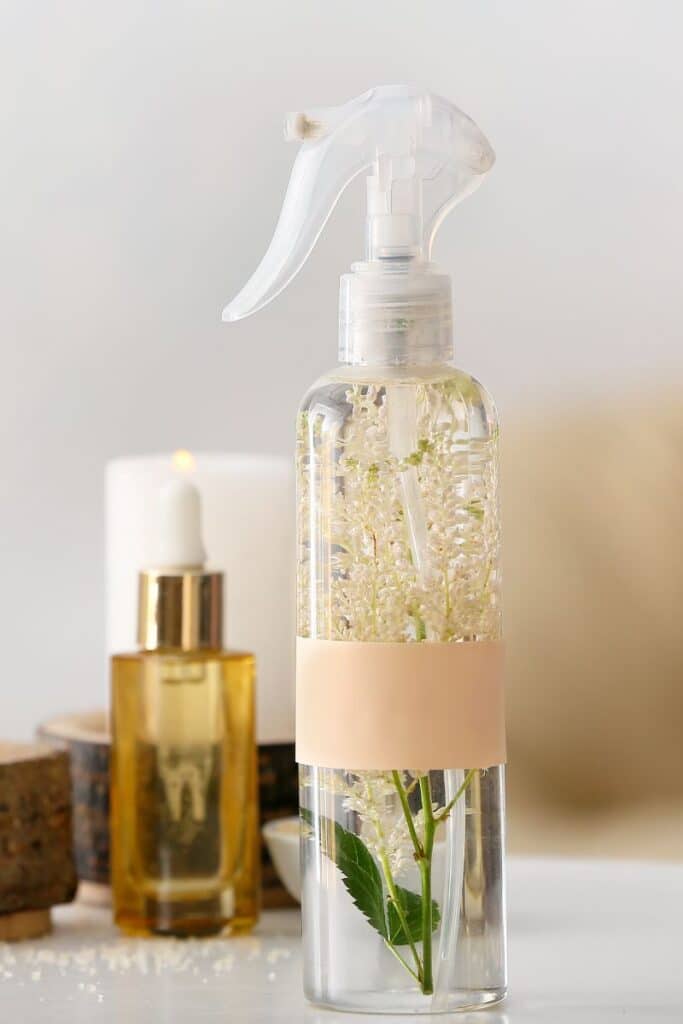
- Khadi Natural Vitality Grow Hair Oil:
- Khadi offers a range of herbal oils and more that are free from harsh chemicals. These shampoos and oils often contain ingredients like amla, shikakai, and reetha, known for their cleansing and nourishing properties.
- Aloe Veda Herbal Hair Oil:
- Veda's herbal hair oil is a nourishing blend of herbs like bhringraj, amla, and neem in a base of coconut oil. It provides deep conditioning and strengthens hair from the roots.
- Forest Essentials Ayurvedic Bhringraj Hair Vitalizer:
- Forest Essentials offers an Ayurvedic hair vitalizer that contains potent herbs like bhringraj and amla. This product is designed to stimulate hair growth and maintain a healthy scalp.
Nutrition and Hair Health
Internal nourishment is as vital as external care. Your hair's health is intricately linked to your diet. Incorporating herbs like amla, rich in vitamin C, and other nutrient-rich foods can fuel your hair's journey towards vitality.
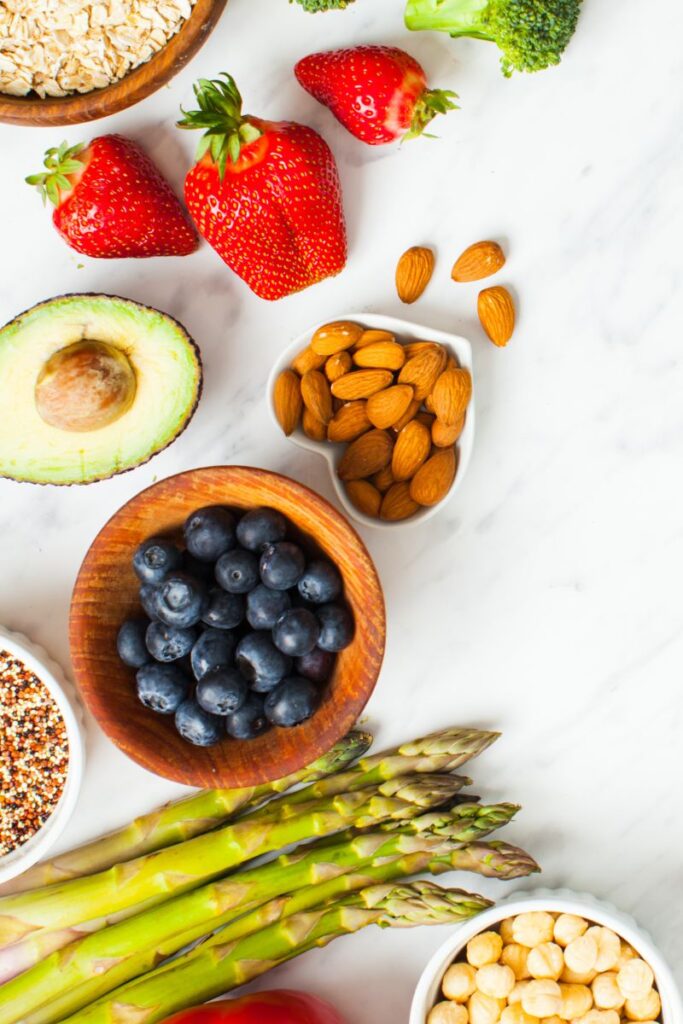
Let's delve deeper into the nutritional aspects of promoting hair growth and health:
1. Protein-Rich Foods
Hair is primarily composed of a protein called keratin. Ensuring an adequate intake of protein-rich foods like lean meats, fish, eggs, tofu, legumes, and nuts can provide the essential building blocks for hair growth and strength.
2. Omega-3 Fatty Acids
Omega-3 fatty acids, found in fatty fish (salmon, mackerel), walnuts, flaxseeds, and chia seeds, help nourish the scalp and hair follicles. They can also reduce inflammation, which can contribute to hair loss.
3. Iron-Rich Foods
Iron deficiency is a common cause of hair loss. Incorporating iron-rich foods like lean meats, lentils, spinach, and fortified foods can help combat this issue and promote healthy hair growth.
4. Vitamin C-Packed Foods
Vitamin C is essential for the production of collagen, which is necessary for hair structure. Foods like citrus fruits, strawberries, kiwi, and bell peppers are excellent sources of vitamin C.
5. Biotin-Rich Foods
Biotin, a B-vitamin, is often associated with hair health. Eggs, nuts, seeds, and sweet potatoes are good sources of biotin that can promote hair growth.
6. Zinc-Containing Foods
Zinc plays a crucial role in hair tissue growth and repair. Foods like oysters, lean meats, whole grains, and nuts are rich in zinc.
7. Vitamin A-Filled Foods
Vitamin A helps produce sebum, a natural hair conditioner. Incorporate foods like sweet potatoes, carrots, and dark leafy greens to support sebum production.
8. Antioxidant-Rich Foods
Antioxidants protect hair follicles from damage caused by free radicals. Berries, nuts, and leafy greens are loaded with antioxidants that contribute to hair health.
9. Silica-Rich Foods
Silica is essential for the formation of collagen, which provides structure to hair. Foods like oats, brown rice, and cucumbers contain silica.
10. Amla (Indian Gooseberry)
As mentioned, amla is rich in vitamin C and antioxidants. It's a staple in Ayurvedic hair care and is believed to promote hair growth and prevent premature graying.
11. Herbal Infusions
Herbs like nettle, horsetail, and rosemary can be made into infusions and consumed as teas. These herbs are believed to strengthen hair and promote growth when consumed regularly.
12. Hydration
Staying well-hydrated is essential for overall health, including hair health. Drinking enough water helps maintain hair's moisture and overall vitality.
Remember, while these foods can support healthy hair, individual results may vary, and it's essential to maintain a balanced diet for overall well-being.
Herbal Tea for Hair: Nourishment from Within
When it comes to promoting hair health, the journey often begins within. Herbal teas offer a delightful and soothing way to nourish your hair from the inside out. Beyond their calming effects on your senses, certain herbal teas are packed with essential nutrients and antioxidants that can significantly benefit your hair.
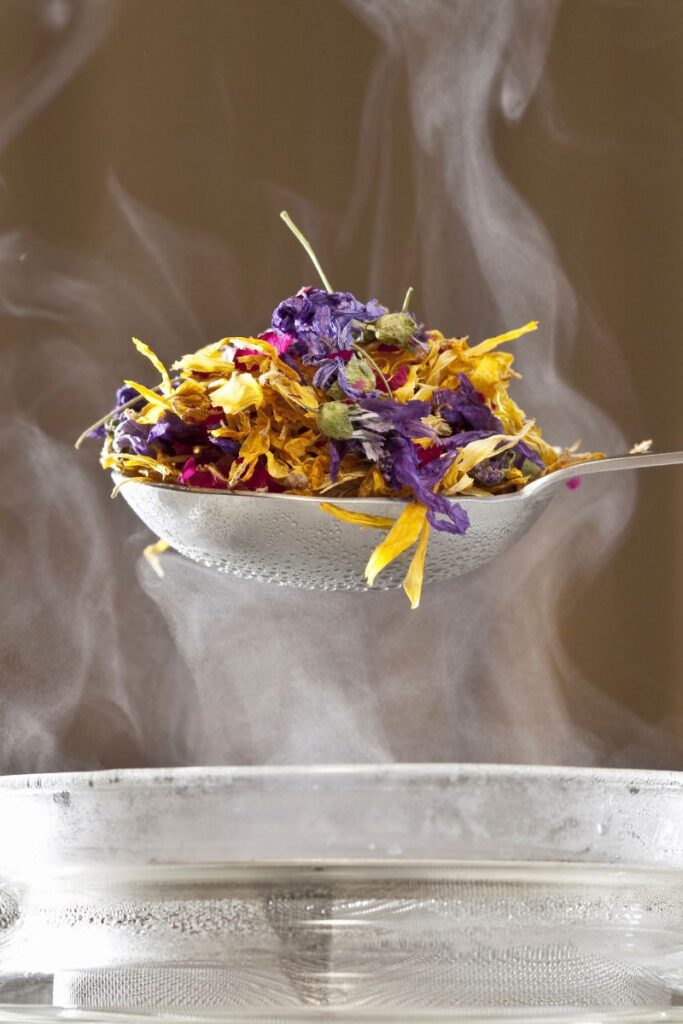
1. Green Tea
Green tea, derived from the Camellia sinensis plant, is renowned for its high concentration of antioxidants, particularly polyphenols called catechins. These antioxidants help combat free radicals, which can damage hair follicles and contribute to hair loss. By sipping on green tea regularly, you're not only boosting your overall health but also providing your hair with the protection it needs to thrive.
2. Ginkgo Biloba Tea
Ginkgo biloba, a tree native to China, is known for its unique fan-shaped leaves and its remarkable benefits for hair and scalp health. Ginkgo biloba tea contains flavonoids and terpenoids, which have powerful antioxidant properties. These compounds promote blood circulation, including to the scalp, which can enhance the delivery of nutrients to hair follicles. Improved blood flow can contribute to stronger and healthier hair.
3. Herbal Blends
Beyond green tea and ginkgo biloba, there are numerous herbal blends that can be tailored to address specific hair concerns. For instance:
- Nettle Tea: Nettle tea is rich in vitamins and minerals, including iron, which can help combat iron deficiency anemia, a common cause of hair loss.
- Horsetail Tea: Horsetail contains silica, a mineral crucial for hair health. Silica helps strengthen hair strands, prevent breakage, and maintain overall hair vitality.
- Rosemary Tea: Rosemary is known for its ability to stimulate hair follicles and promote hair growth. A cup of rosemary tea can provide a gentle yet effective boost to your hair's natural growth cycle.
How to Incorporate Herbal Teas into Your Routine
To harness the benefits of herbal teas for your hair, consider incorporating them into your daily routine:
- Regular Consumption: Aim to drink herbal teas consistently, ideally as part of your daily hydration routine. A cup or two per day can make a noticeable difference over time.
- Natural Hair Rinse: You can also use cooled herbal tea as a natural hair rinse after shampooing. Pour the tea over your hair, gently massage your scalp, and then rinse with cool water. This can add shine and vitality to your locks.
- Scalp Massage: While sipping on your herbal tea, take a few moments to perform a gentle scalp massage. This can help improve blood circulation to the scalp, ensuring that the nutrients from the tea are effectively delivered to your hair follicles.
Incorporating herbal teas into your hair care routine is not only a nourishing practice but also a soothing and enjoyable one. As you sip on your cup of tea, you're not just taking a moment for yourself; you're also nurturing the health and beauty of your hair, from the inside out.
Herbal Supplements For Hair Thickness and Shine
While a balanced diet and external hair care routines are crucial for maintaining healthy locks, there are instances where a little extra support may be needed to address specific hair concerns. Herbal supplements, when used wisely and with proper guidance, can be valuable additions to your overall hair care regimen. They provide your hair with the essential nutrients and herbal extracts it craves to thrive.
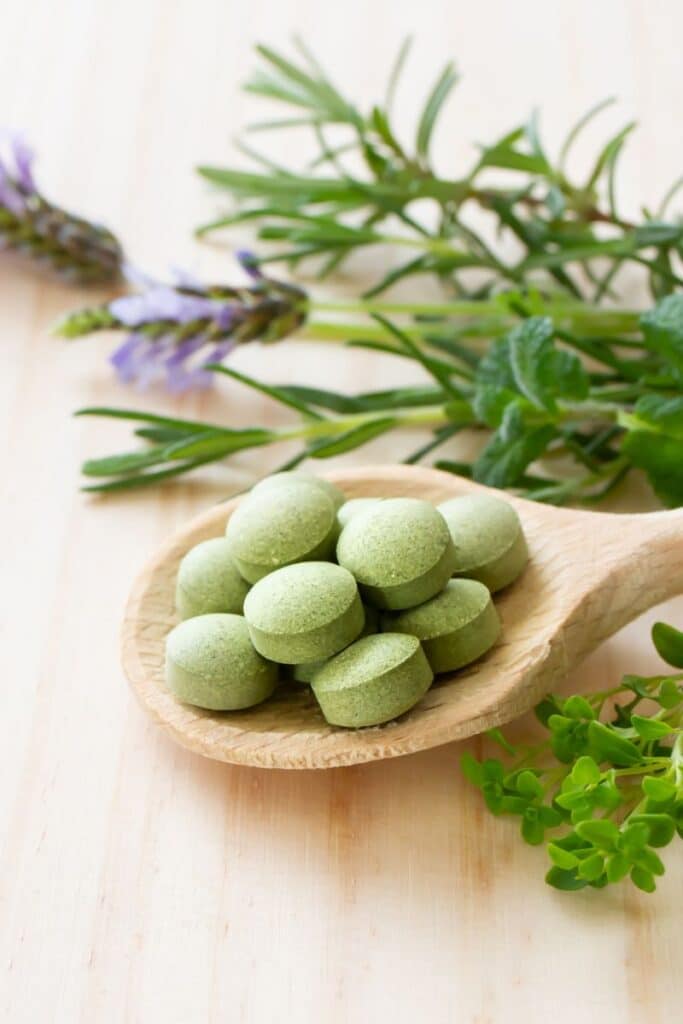
1. Saw Palmetto
Saw palmetto, derived from the berries of the Serenoa repens plant, is often associated with supporting hair health, particularly in cases of androgenetic alopecia (pattern baldness). It's believed to work by inhibiting the conversion of testosterone to dihydrotestosterone (DHT), a hormone linked to hair loss. By reducing DHT levels, saw palmetto may help slow down hair thinning and promote hair retention.
2. Ginkgo Biloba
Ginkgo biloba, known for its cognitive benefits, also has advantages for hair and scalp health. Its antioxidant properties can improve blood circulation, including to the scalp. Enhanced blood flow ensures that hair follicles receive an ample supply of nutrients and oxygen, promoting hair growth and overall hair vitality.
3. Biotin Supplements
Biotin, a B-vitamin, is essential for hair health. It plays a key role in the production of keratin, the protein that forms the structure of hair strands. Biotin supplements can help strengthen hair, prevent hair breakage, and promote healthy hair growth. They are often recommended for individuals with biotin deficiencies, but they can also benefit those seeking to enhance hair health.
4. Other Herbal Supplements
Depending on your specific hair needs, there are several other herbal supplements to explore:
- Nettle Root Extract: Nettle root is rich in vitamins and minerals, including iron and silica. It can help combat iron deficiency anemia and promote hair strength.
- Pygeum Bark Extract: Pygeum is known to inhibit the production of DHT, making it beneficial for those concerned about hair loss.
- Fo-Ti (He Shou Wu): This traditional Chinese herb is believed to restore hair's natural color and promote hair growth.
Guidelines for Using Herbal Supplements
- Consultation: Before adding any herbal supplement to your routine, consult with a healthcare professional or a qualified herbalist. They can assess your individual needs and provide guidance on the appropriate dosage and duration.
- Quality Matters: Ensure that you choose high-quality supplements from reputable sources to ensure purity and effectiveness.
- Consistency: For supplements to be effective, consistency is key. Follow the recommended dosage consistently over time.
- Monitor and Adjust: Pay attention to how your body responds to the supplements. If you experience any adverse effects, discontinue use and consult a healthcare professional.
- Combine with a Healthy Lifestyle: Remember that supplements work best when complemented by a balanced diet, proper hydration, and a healthy lifestyle.
While herbal supplements can be valuable tools in promoting hair health, they should be used judiciously and under professional guidance. When integrated into a comprehensive hair care strategy, herbal supplements can provide the extra support your hair needs to flourish.
Cautions and Allergies
While herbs offer a natural path to hair health, it's essential to exercise caution. Be aware of potential allergies and side effects, and conduct patch tests before applying herbs to your scalp or using herbal supplements.
Hair Care Tips
Sustain the health of your hair with simple yet effective tips. Incorporate herbal products into your routine, minimize heat styling, and protect your hair from environmental stressors. Consistency is key to seeing the best results.

Minimize Heat Styling
Excessive use of heat styling tools like flat irons, curling irons, and hair dryers can damage your hair, making it prone to breakage and dullness. Whenever possible, embrace your hair's natural texture and limit heat styling. If you must use heat, apply a heat protectant product to reduce potential damage.
Protect from Environmental Stressors
Your hair faces environmental stressors daily, from UV rays to pollution. Protect it by wearing a hat or using hair care products with UV protection when spending time in the sun. Rinse your hair after swimming in chlorinated pools and avoid overexposing it to saltwater, which can be drying.
Regular Trims
Trimming your hair regularly (about every 6-8 weeks) removes split ends and prevents them from traveling up the hair shaft, ultimately leading to healthier-looking hair.
Gentle Handling
Handle your hair gently to minimize breakage. Use a wide-tooth comb or a brush with soft bristles to detangle your hair, starting from the tips and working your way up. Avoid aggressive brushing, especially when your hair is wet, as it is more fragile.
Stress Management
Chronic stress can negatively impact hair health. Practice stress management techniques like meditation, yoga, or deep breathing to reduce stress and support hair growth.
Consistency is Key
Consistency in your hair care routine is crucial to see the best results. Stick to a regimen that works for you and be patient, as hair growth and improvement in hair texture often take time.
Listen to Your Hair
Pay attention to how your hair responds to different products and treatments. Everyone's hair is unique, so what works for one person may not work for another. Adjust your routine based on your hair's specific needs.
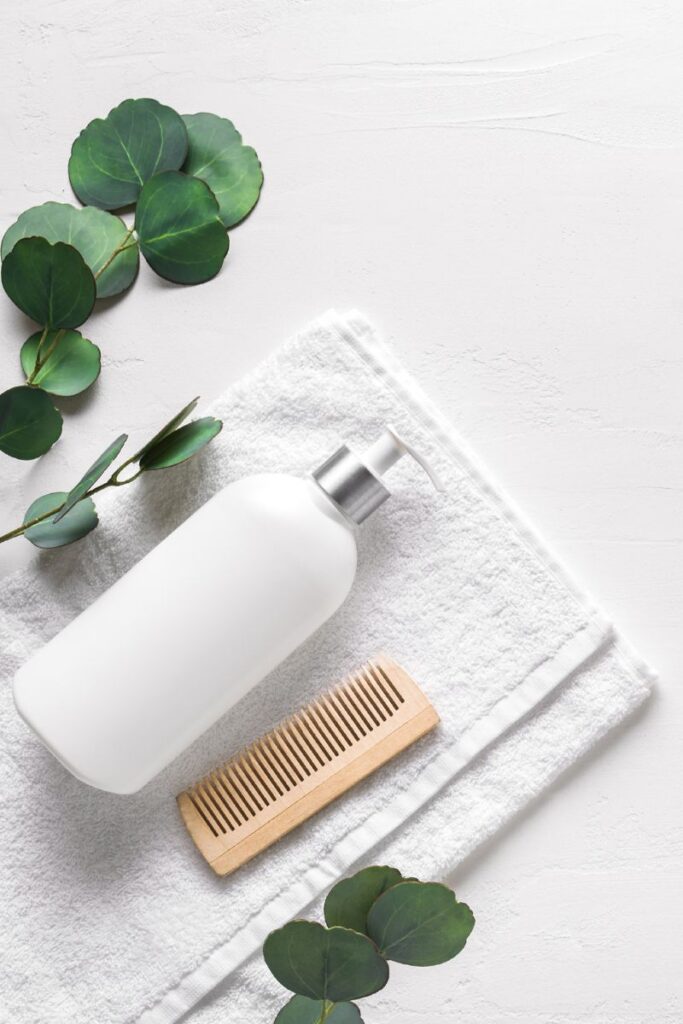
Consulting a Professional
While herbs are powerful allies in your quest for healthy hair, there are moments when seeking advice from a herbalist or healthcare provider becomes crucial. They can provide personalized guidance, ensuring you make informed choices tailored to your unique needs.
It's especially important to consult your primary care provider when you have reason to believe a deficiency is at play. An herbal remedy for healthy hair can help most cases, but if you're consistently losing hair and not feeling your best; it's time to consult a doctor.
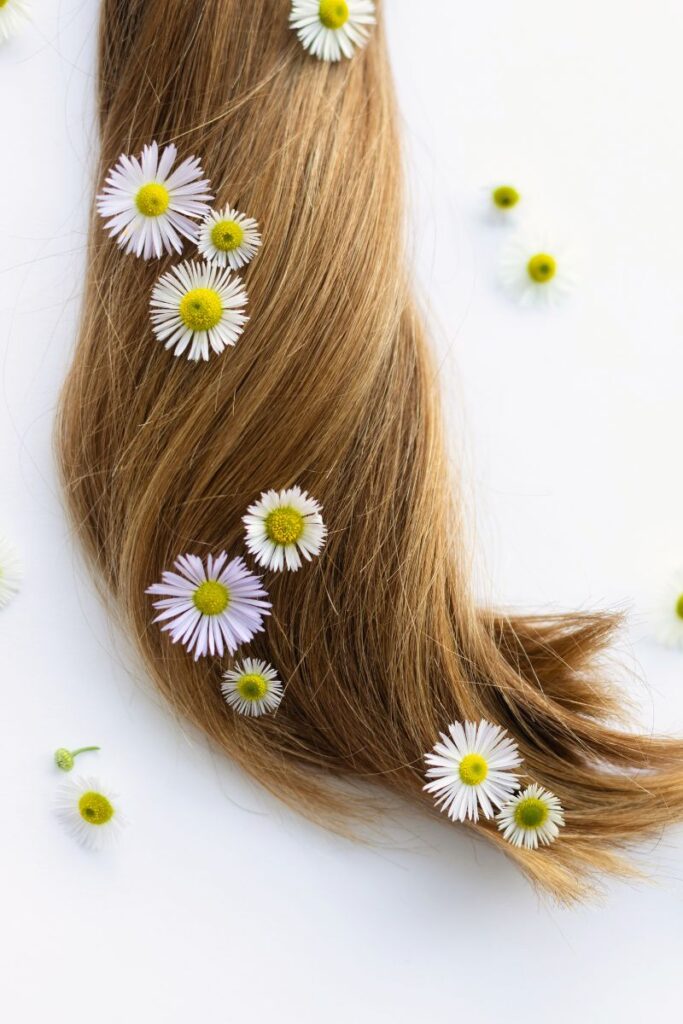
Conclusion
As we conclude our exploration of the world of herbs and hair, let's reiterate the profound connection between them. From aloe vera's healing touch to rosemary's invigorating embrace, the holistic approach of herbal remedies aligns perfectly with the belief that herbs can heal the body, and food is medicine for your hair.
Embrace this wisdom, explore herbal remedies, and embark on a path to vibrant, luxurious locks. Your hair deserves nothing less, and your journey towards hair health begins now.
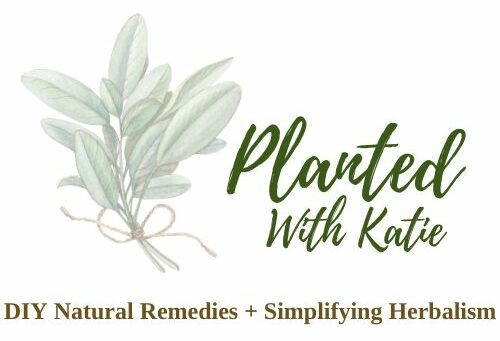




[…] Best Herbs For Hormonal Acne (Natural Remedies) 7 Best Herbs For Hair Growth and Thickness (With Recipes) 10 Home Remedies To Naturally Get Rid Of Cold Sores (Herbal Remedy For Cold […]
[…] palmetto‘s potential to affect testosterone levels is of particular interest when it comes to hair health and specifically, women’s hair loss. As mentioned in the section above, DHT […]